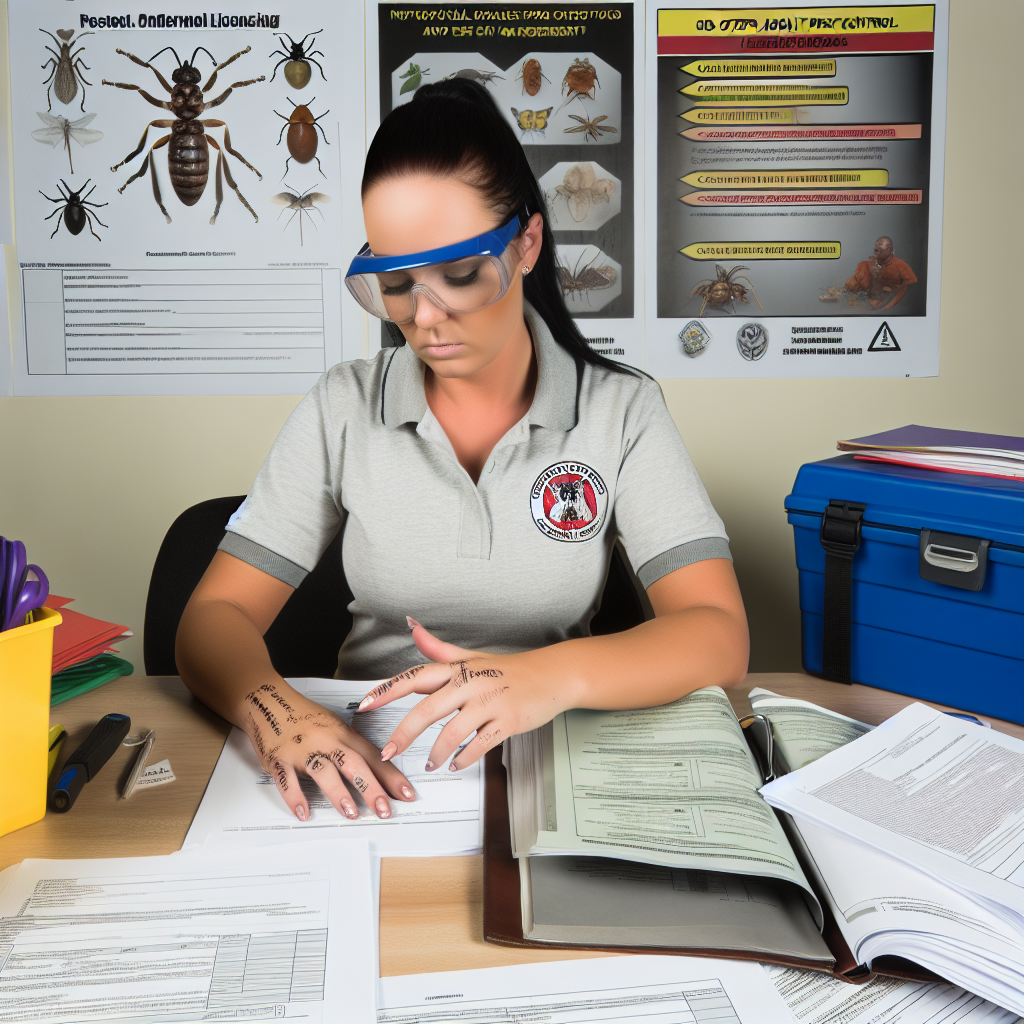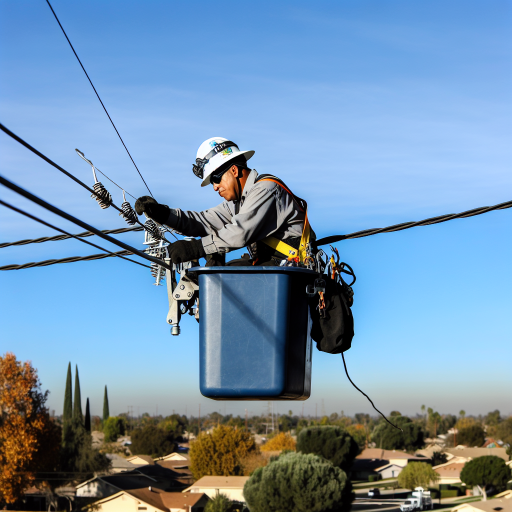Introduction:
Securing the necessary licenses for pest control jobs is crucial for professionals in the industry.
Licensing ensures that technicians are qualified and competent to handle various pests effectively.
In this blog post, we will discuss the importance of licensing in the pest control industry, the process of obtaining these licenses, and how it impacts career opportunities in this field.
Understand the requirements:
When pursuing a career in pest control, it is crucial to understand and comply with the licensing requirements in your state.
Each state may have specific regulations and qualifications that must be met in order to legally perform pest control services.
By conducting thorough research, you can ensure that you are properly licensed and equipped to perform your job effectively and legally.
- Research and familiarize yourself with the specific licensing requirements in your state.
- Determine the different types of licenses needed for various pest control jobs.
- Contact the appropriate licensing board for more information.
Different types of pest control jobs may require different types of licenses.
For example, individuals who handle chemicals for pest control may need a pesticide applicator license.
On the other hand, those who specialize in wildlife removal may need a wildlife control operator license.
It is important to determine the specific licenses required for the type of pest control work you will be performing.
Contacting the appropriate licensing board is a vital step in the process of obtaining the necessary licenses for pest control jobs.
Licensing boards typically oversee the regulation and issuance of licenses for pest control professionals.
By reaching out to the licensing board, you can get accurate information on the specific requirements, application process, and any additional steps needed to obtain the relevant licenses for pest control jobs.
Complete necessary training:
- Enroll in a pest control training program or courses to gain the required knowledge and skills.
- Obtain any certifications or accreditations that may be necessary for licensing.
- Keep up to date with the latest industry trends and regulations.
Obtaining the proper training is essential for anyone looking to enter the pest control industry.
By enrolling in a pest control training program or courses, individuals can gain the necessary knowledge and skills to excel in this field.
These programs cover a wide range of topics, including pest identification, control methods, and safety protocols.
Additionally, obtaining certifications or accreditations is often a requirement for licensing in many states.
These certifications demonstrate to customers and employers that you have met certain industry standards and are qualified to perform pest control services.
Some common certifications include the Structural Pest Control Board license, Certified Pest Control Operator license, and the National Pest Management Association certification.
It is also crucial to stay up to date with the latest industry trends and regulations.
Transform Your Career Today
Unlock a personalized career strategy that drives real results. Get tailored advice and a roadmap designed just for you.
Start NowThe pest control industry is constantly evolving, with new pests emerging and new control methods being developed.
By staying informed, pest control professionals can ensure they are providing the most effective and environmentally friendly solutions to their clients.
Find Out More: Top 5 Machinist Tools and Their Uses Explained
Prepare and Submit the Application:
Gather all necessary documentation, including proof of training and experience.
Make sure you have all the required documents in hand before starting the application process.
Documentation may include certificates of completion from pest control training programs.
Experience can be verified through work history or letters of recommendation from previous employers.
Having these documents ready will streamline the application process and help avoid delays.
Complete the licensing application accurately and thoroughly.
Double-check all information provided on the application form for accuracy and completeness.
Errors or omissions can lead to delays in processing or even rejection of your application.
Take your time to ensure that all fields are filled out correctly and that you provide all required information.
Pay any required fees and submit the application within the specified timeframe.
Make sure to include the applicable fees with your application to avoid any processing delays.
Check the licensing authority’s website for information on accepted payment methods and deadlines.
Submitting your application on time is crucial to prevent any gaps in your licensing status.
- Gather all necessary documentation, including proof of training and experience.
- Ensure you have all the required documents before starting the application process.
- Documentation may include certificates of completion from pest control training programs.
- Experience can be verified through work history or letters of recommendation from previous employers.
- Having these documents ready will streamline the application process and help avoid delays.
- Complete the licensing application accurately and thoroughly.
- Double-check all information for accuracy and completeness.
- Take your time to ensure that all fields are filled out correctly.
- Pay any required fees and submit the application within the specified timeframe.
- Check the licensing authority’s website for information on accepted payment methods and deadlines.
- Submitting your application on time is crucial to prevent gaps in your licensing status.
Explore Further: Tips for Successful Construction Project Planning
Pass the licensing exam:
Study and prepare for the licensing exam by reviewing study materials and taking practice tests.
Schedule the exam at a designated testing center.
Successfully pass the exam to obtain your pest control license.
Transform Your Career Today
Unlock a personalized career strategy that drives real results. Get tailored advice and a roadmap designed just for you.
Start Now- Study and prepare for the licensing exam by reviewing study materials and taking practice tests.
- Schedule the exam at a designated testing center.
- Successfully pass the exam to obtain your pest control license.
Learn More: The Role of Assemblers in the Automotive Industry

When it comes to working in pest control, having the proper licensing is crucial.
This ensures that you are qualified to handle various chemicals and treatments safely and effectively.
Here are some key points to consider when navigating licensing for pest control jobs:
Research licensing requirements:
- Understand the specific requirements set by your state or local licensing board.
- Check if there are different levels of licensing based on the type of pest control work you will be doing.
- Find out if there are any additional certifications or training programs needed to obtain your license.
Prepare for the licensing exam:
- Study the materials provided by the licensing board to ensure you are well-prepared for the exam.
- Consider taking a preparatory course or workshop to further enhance your knowledge and skills.
- Practice with sample questions to familiarize yourself with the format and types of questions that may be asked.
Apply for your pest control license:
- Submit all required documentation, including your exam scores, proof of training, and any other requested materials.
- Pay the necessary fees associated with the application process.
- Wait for confirmation from the licensing board regarding the status of your application.
Adhere to licensing regulations:
- Review the code of ethics and regulations set forth by the licensing board to ensure compliance.
- Keep track of any changes or updates to licensing requirements that may affect your status.
- Participate in inspections or audits as required by the licensing board to maintain your license.
Maintain your license:
- Renew your pest control license according to the renewal schedule set by the licensing board.
- Fulfill any continuing education requirements to stay current in the field.
- Update your license information as needed, such as a change of address or business name.
By following these steps and staying proactive in managing your pest control license, you can ensure that you are meeting all necessary requirements and operating within the legal parameters of your profession.
Remember, maintaining proper licensing not only protects you and your clients but also upholds the standards of professionalism within the pest control industry.
Delve into the Subject: The Evolution of Machining Technology Over Time
Stay Compliant with Regulations:
- Adhere to all local, state, and federal regulations governing pest control practices.
- Maintain proper records of your work and communicate effectively with clients about the services provided.
- Conduct business ethically and responsibly to uphold the integrity of the industry.
As a pest control professional, it is imperative to always stay compliant with regulations set forth by local, state, and federal authorities.
These regulations exist to ensure the safety of both the pest control operators and the clients they serve.
By adhering to these regulations, you not only protect yourself from legal consequences but also maintain trust with your clients.
Keeping proper records of your work is crucial in demonstrating compliance with regulations.
Detailed documentation of the pest control services provided, including the type of pest treated, the products used, and the methods employed, is essential.
This information not only helps in case of any disputes but also enables effective communication with clients regarding the services rendered.
Communication with clients is key in pest control jobs.
It is essential to explain the pest control process, the potential risks involved, and the precautions that need to be taken.
Clients should be informed about the products used, their impact on the environment, and any follow-up measures that may be required.
By maintaining open and honest communication, you build trust with your clients and ensure their satisfaction with your services.
Operating ethically and responsibly is a hallmark of a professional pest control operator.
This involves using environmentally friendly products, minimizing the use of pesticides, and employing integrated pest management techniques whenever possible.
By adopting sustainable practices, you not only protect the environment but also ensure the long-term effectiveness of your pest control solutions.
Transform Your Career Today
Unlock a personalized career strategy that drives real results. Get tailored advice and a roadmap designed just for you.
Start NowStaying compliant with regulations, maintaining proper records, communicating effectively with clients, and conducting business ethically are essential aspects of navigating licensing for pest control jobs.
By following these guidelines, you can establish yourself as a reputable and trustworthy pest control professional in the industry.
Importance of Pest Control Licensing
Licensing for pest control jobs is crucial for ensuring professional standards in the industry.
This measure promotes safety and compliance among practitioners.
By following the outlined steps, individuals can navigate the licensing requirements effectively.
It is vital to emphasize the significance of obtaining necessary credentials.
Adhering to regulations builds credibility with clients.
Readers are encouraged to take proactive steps to understand the licensing process.
By doing so, they can pave the way for a successful career in the pest control profession.
Additional Resources
Restaurant Industry Job Descriptions | National Restaurant …
Handbook of Occupational Groups and Families
[E-Books for Sale]
The Big Book of 500 High-Paying Jobs in America: Unlock Your Earning Potential
$19.99 • 500 High-Paying Jobs • 330 pages
Explore 500 high-paying jobs in America and learn how to boost your career, earn more, and achieve success!
See All 500 High-Paying Jobs of this E-Book
1001 Professions Without a Degree: High-Paying American Jobs You Can Start Now
$19.99 • 1001 Professions Without a Degree • 174 pages
Discover 1001 high-paying jobs without a degree! Unlock career tips, skills, and success strategies for just $19.99!




